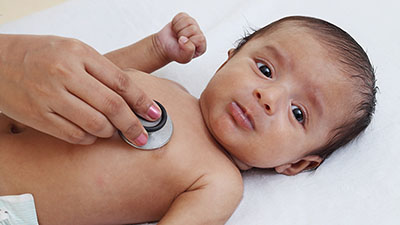What Parents Should Know About RSV
 You may be hearing about a respiratory infection that’s hitting babies and young children particularly hard this year, sometimes resulting in hospital stays. The current headlines are referring to RSV, which is short for respiratory syncytial virus.
You may be hearing about a respiratory infection that’s hitting babies and young children particularly hard this year, sometimes resulting in hospital stays. The current headlines are referring to RSV, which is short for respiratory syncytial virus.
On the Pulse asked Dr. Tony Woodward, medical director of emergency medicine at Seattle Children’s, to share information about RSV in an effort to help parents and caregivers keep their families as healthy as possible through this viral season which also includes flu and COVID-19.
What is RSV?
RSV is a virus passed from person to person that affects the nose, throat and lungs. People of any age can get RSV, but it’s most serious for young children and older adults. Most kids are infected with RSV at least once before they’re 2 years old. For healthy people, RSV usually results in a cold, but some people get very sick, developing bronchiolitis, wheezing/asthma or pneumonia.
Bronchiolitis due to RSV is the leading cause of hospitalization for infants in the United States, but according to the American Academy of Pediatrics, only about 3% of children with RSV will require a hospital stay.
Why is RSV in the news?
RSV season typically runs from December to April, with a peak of infections in February and March, but this is an early RSV season. Hospitals around the country, especially children’s hospitals, are currently seeing unusually high numbers of RSV cases, putting additional strain on the already-stretched healthcare system.
“In addition to being early, this season is likely to be severe,” said Woodward. “In typical years, children get many viral infections spread out over their first two years of life. Because of the success of masking and social distancing, those viral infections are all being clustered at the same time. Throughout our hospital and urgent care clinics, many respiratory viral tests per day are positive for RSV, and numbers are likely to go higher.”
While not all of the patients who test positive for RSV require the supportive care provided during a hospital stay, some need to be admitted to receive aggressive suctioning to remove secretions, oxygen to help with breathing difficulties and/or hydration through an IV. Those children are presenting to hospitals that are often already full and often over capacity.
“The Seattle Children’s Emergency Department (ED) saw record high numbers of pediatric patients in October,” said Woodward. “Peak numbers of presenting patients are usually seen around the mid-winter season, when they are typically at their highest of the year due to viruses. We have never seen this number of patients coming to the ED for care. We expect volumes to continue to rise and are optimizing and increasing staffing and space to try to care for more children.”
What are the symptoms of mild RSV?
Typical RSV symptoms can include low grade fever, cough, runny nose or congestion, sneezing, poor feeding and fussiness. There may be faster breathing evidence of increased respiratory effort (retractions) and lower levels of oxygen (cyanosis, or blueness).
There’s no specific medicine for RSV, but you can treat the symptoms if your child is uncomfortable (fever medicine, fluids (babies often do better with more frequent, lower volume of fluids, to enable the babies to catch their breath while eating). These symptoms usually last 5 to 7 days. See the resources below for how to treat these mild symptoms.
What are the symptoms of RSV that need medical attention right away?
Call your child’s regular health care provider right away if your baby or child:
- Is less than 8 weeks old and has a fever (body temperature over 100.4 degrees F).
- Has sustained fever over 104 degrees F, no matter their age.
- Is lethargic or hard to arouse.
- Is dehydrated (no tears when crying, no (or dark) urine in 8-12 hours or very dry mouth).
- Is experiencing mild trouble breathing (fast or harder).
- Has RSV symptoms along with a chronic health condition, like a heart defect or lung disease.
You know your child best, so also contact your health care provider if you’re concerned. Use telehealth or urgent care if your child’s provider’s office is closed.
When RSV is severe, your baby or child may have trouble breathing, called respiratory distress. Signs can include:
- Fast breathing
- Flaring nostrils
- Drawing in of chest between, over or under ribs during breathing
- Wheezing when breathing in or out
- Grunting (making noises when breathing out)
- Changes (bluish) in skin color around the lips and under eyes. (This may not be visible on darker skin tones.)
Pay close attention to your child’s breathing and behavior. If your child is having severe difficulty breathing, call 911.
Which babies and young children are most at risk of severe illness from RSV?
Some babies and young children have a higher risk of a severe RSV infection. They include:
- Babies who are 12 weeks old or younger when RSV season begins.
- Premature babies (especially those born before 29 weeks gestation).
- Babies born with low birth weight.
- Children with chronic lung disease, certain heart defects or weak immune systems due to illness or treatments.
- Children exposed to secondhand smoke at home or whose mother’s smoked during pregnancy.
In some cases, doctors prescribe a series of anticipatory monoclonal antibody shots for infants who are at very high-risk of severe RSV infection. Your baby’s doctor will discuss this with you if they recommend the treatment for your high-risk infant.
How can my family avoid getting RSV?
Dr. Woodward offered these tips to help protect your family from RSV and other viruses:
- Stay home from daycare, school and work when sick.
- Ask family and friends not to visit your home or attend gatherings when they’re sick.
- Consider wearing a mask when in public or around those you don’t live with.
- Wash hands often and well. Teach your child how to wash properly.
- Use hand sanitizers often.
- Cover noses and mouths when coughing or sneezing.
- Use tissues or the crook of your elbow when you cough or sneeze.
- Throw tissues away in a covered trash bin right after use.
- Keep your hands away from your face.
- Avoid sharing personal items, such as binkies, utensils, toothbrushes, towels and toys.
- Clean surfaces often, including toys, doorknobs, phones and keyboards.
Is there a vaccine to protect against RSV?
While there are vaccines to help protect against flu and COVID-19, there is no RSV vaccine. An RSV vaccine is currently in development, with research contributed by Seattle Children’s. Several have been tested including two in elderly individuals and one in pregnant women. The vaccines will hopefully be submitted to the FDA for approval and licensure in the near future.
Resources:
- RSV-Bronchiolitis (seattlechildrens.org)
- RSV: When It’s More Than Just a Cold
- Tri-demic? Time to increase protections against surging respiratory viruses
- Colds
- How to Suction Your Baby's Nose (PDF)
- Fever (0 to 12 Months)
- Fever
- Breathing Trouble
- Emergency or Urgent Care?
- Seattle Children’s Urgent Care Clinic in Seattle
- Seattle Children’s Urgent Care Clinic in Bellevue
- Seattle Children’s Urgent Care Clinic in Everett
- Seattle Children’s Urgent Care Clinic in Federal Way

